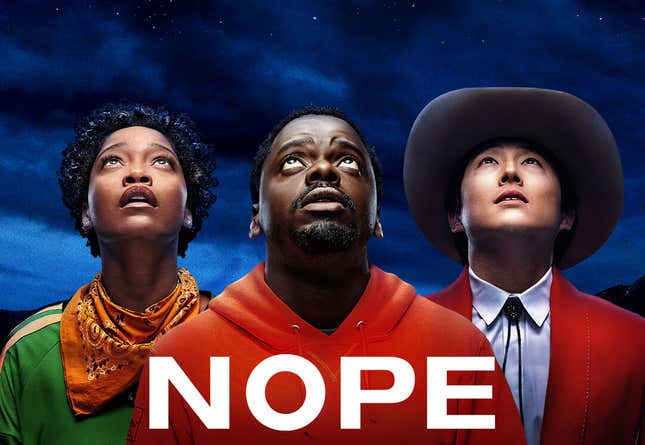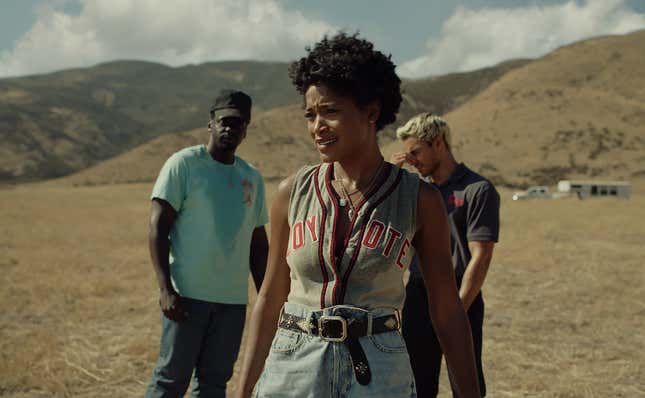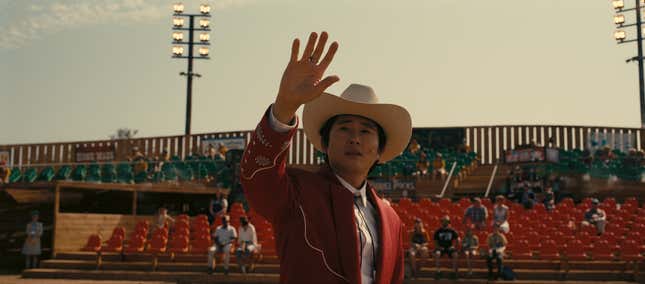
After flambéing middle-class, white liberals in 2017’s Get Out, only to take classism and “ignoring the ramifications of privilege” to task in 2019’s Us, Jordan Peele—whose tether became the first Black writer-director to crack $100 million with his cinematic debut—has returned to torment and bewilder us all with his latest creation, Nope.
Following in the footsteps of his previous films, Nope draws inspiration from Royce da 5'9"’s eighth studio album and leans heavily into allegory—in that nothing unveiled during its 131 minutes of runtime should be taken at face value; except, of course, the film’s title, which Daniel Kaluuya (who plays wily horse wrangler OJ Haywood) insists earned its name because it’s “the reaction that Black people will have when they watch it.”
SPOILER WARNING: He ain’t lying.
As someone who had the privilege of attending Nope’s world premiere on July 18th at Hollywood’s legendary TCL Chinese Theatre, I overheard more than my fair share of “nopes” and “oh hell nahs” as the hundreds of horror fans in attendance took turns being either astounded or mystified by what we collectively witnessed on screen. Now, as to whether or not any of us completely understood what it is we watched is a conversation for another day—I’ll be the first to admit that I spent a good hour or so standing outside of the theatre after the premiere trying to make sense of Nope’s more confounding elements, with some familiar names you might recognize—but I’ll happily delve into some of my own theories and interpretations.
And yes, this includes spoilers.
Hollywood Is Pretty Fucked Up—as Is Our Relationship With It
I’ll spare you my own personal horror stories about how foul the entertainment business is, but this is unquestionably a prevailing theme throughout Nope.
At the onset of the film, we’re introduced to Ricky “Jupe” Park, a former child star who survives arguably the most traumatic experience imaginable outside of using a porta-potty—or Ray J butchering “One Wish” during Verzuz. With this horrific encounter—in which Park’s chimpanzee co-star loses its shit and turns the set of their sitcom, Gordy’s Home, into a gruesome murder scene—serving as a catalyst, Park ascends into adulthood and eventually pours his anguish into a Wild West-themed amusement park, Jupiter’s Claim; which not only transforms his unfathomable trauma into a twisted carnival attraction, but allows him to exact some semblance of revenge on the poor horses he’s purchased from the Haywood Hollywood horse ranch (more on that later). This premise becomes even more fucked up when you factor in that OJ and Emerald Haywood (masterfully played by Keke Palmer) only sold the horses to Park because their ranch—which trains and handles horses for film and TV projects, and has done so since the birth of Black cinema—has fallen on hard times. There’s also the fact that despite the predicament that Hollywood has put her family in, Emerald remains obsessed with the glitz and glamor of everything the entertainment industry has to offer—even though it’s eluded her thus far.

So for those keeping track at home, despite all of their lives being tainted or otherwise derailed as a byproduct of their relationship with the entertainment industry, it still reigns supreme as their lord and master. Now, think long and hard about all the things we all have a symbiotic relationship with that do far more harm than good—food being an excellent example—and this film provides us with plenty to ponder.
“History Is Written by the Victors”
If the combined might of mediocre white men and the GOP has taught us anything since the dawn of time, it’s this quote—which is often attributed to Winston Churchill, but hits a little different when you don’t have the complexion for protection. Just ask our Indigenous neighbors, who’ve watched their customs and dignity evaporate in real-time while America flourishes on stolen land—all while adorned in its finest Atlanta Braves or Florida Seminoles regalia.
That said, in being mindful of this recurring phenomenon—which also doubles as America’s favorite pastime—instead of leaving the discovery of the alien creature (I guess the cat’s out the bag!) to Park or TMZ or whoever else, OJ and Emerald—with a little help from a nosey Fry’s Electronics employee (Angel Torres, played by Brandon Perea) and a world-renowned cinematographer (Antlers Holst, played by Michael Wincott)—personally seek out to capture evidence of the unidentified flying object’s existence in order to quell their financial woes.
“You can’t have Black people in a flying saucer film and just have it be the same experience,” Peele told Today prior to Nope’s release. “It’s not. There’s a different relationship.”
Pretty much.
As such, OJ and Emerald’s desire to control the narrative regarding their discovery of the alien is much deeper than mere financial gain. There’s a loooooong (perhaps I should use a few more O’s) history of Black people being erased from our own experiences, and this complex dynamic also speaks to the allure of spectacle—in that the Haywoods know that proof of their plight—dead father, bloody rain, regurgitated horses, and all—is lucrative. And if social media and our multibillion-dollar entertainment industry have taught us anything, it’s that there’s big business in curiosity and all the things we can’t turn away from.
Park admits it himself when he introduces the Haywoods to a secret room adorned with relics from his traumatic past: “I usually charge a fee for this.”
And he does; not just because he can, but because pain and suffering—no matter how demented or grotesque—is a profitable business venture. Even more so if you can prove that anguish actually occurred.
Case in point, how many true-crime podcasts did you listen to today?
PETA Is Gonna be Pissed
I would imagine that a film rife with homicidal chimpanzees and decapitated horses isn’t gonna be popular with anyone who prides themselves on rocking “human” leather jackets or protesting dog shows dressed as—of all things—Klan members. (Yes, that really happened.)
That being said, Nope offers a unique—if not disturbing—exploration into the consequences of disturbing the natural order of our ecosystem. Especially as it pertains to the delicate balance of nature.

While it’s unclear what exactly it was that triggered the ape, Gordy, at the beginning of the film, it’s implied that it lost its shit as a byproduct of human stimuli. This point is reiterated by OJ, who repeatedly stresses the importance of meticulous care while handling horses on set. And what happens when humans get reckless? Animals react in kind and deploy violent means to preserve both their safety and survival. So if this happens with Gordy (who kills everyone on set) and Lucky (who kicks a set worker), is it safe to assume that Jean Jacket’s murderous rampage was precipitated by ill-informed, human interaction too?
In closing, there’s plenty to be culled from Nope—far more than the surface I barely even began to scratch at. But the most important thing is this: it’s a remarkable movie that each of us can learn from if we’re attentive, analytical, and open-minded.
Just avoid eye contact at all costs.

